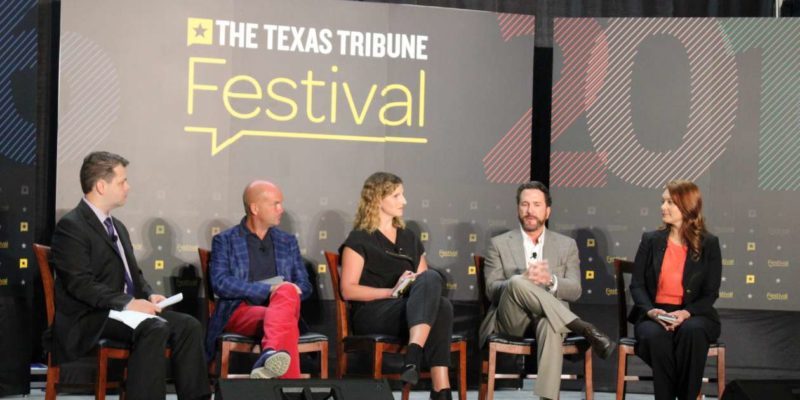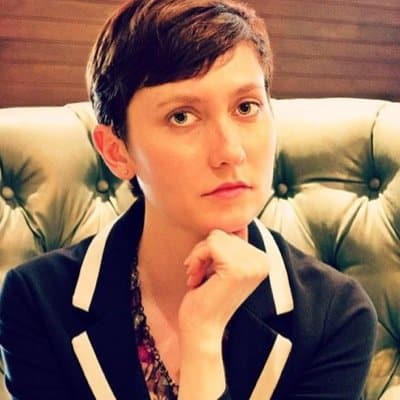Introduction
AUSTIN, Texas — A small group of campaign super-donors agreed that the campaign finance system in the U.S. needs reform, but said in the meantime, they are following the rules of the current system and using their donations to fund campaigns that advance causes they support.
This was the message delivered by a panel moderated by Dave Levinthal, senior reporter at the Center for Public Integrity, at the Texas Tribune Festival in Austin on Saturday. (Listen to the full discussion here.)
“I agree that Citizens United is a flawed decision, I don’t think I would go so far as to call it bribery because I don’t think that’s what it is,” said Austin-based philanthropist Aimee Boone Cunningham.
The 2010 Citizens United v. Federal Election Commission decision “changed the rules of the game for how money may flow into elections,” Levinthal said. It paved the way for the creation of super PACs and politically active nonprofits.
“The way I see it, my challenge as a donor is to find the candidates and the organizations that are doing work on the issues that I care about and then to lift them up,” Cunningham said. She gives to candidates that she feels empower women. The big-dollar donor, who helps fund groups that advocate for abortion rights, supports Democratic nominee Hillary Clinton and backed Wendy Davis’ campaign for Texas governor.
But even the most generous donations cannot guarantee that a candidate will be elected to office.
Doug Deason, president of Deason Capital Services, said the impact of these funds is limited. He noted that the presidential race between Hillary Clinton and Donald Trump is close despite Clinton’s substantially larger fundraising totals.
“Essentially, [Trump] is tied in the national polls and leading some of the swing states and he hasn’t spent that money. That’s pretty impressive. I think that shows how little impact money really has on political races,” Deason said.
According to a Center for Public Integrity analysis of campaign filings, Trump has so far raised $189 million through his campaign and super PACs compared to Clinton’s $530 million.
Toby Neugebauer, founder of Quantum Energy Partners, recently experienced the limits to money’s influence on politics first hand after he donated $10 million to Keep the Promise II, a super PAC supporting the failed presidential campaign of U.S. Sen. Ted Cruz of Texas. The contribution was one of the largest amounts given by a single donor to a super PAC.
“I felt that if we could raise a serious amount of money, then Ted’s campaign would be taken seriously very early,” Neugebauer said.
He added that U.S. Sen. Bernie Sanders failed to garner the Democratic presidential nomination not because he lacked adequate funds but rather because he failed to win enough votes from super delegates.
The U.S. senator from Vermont is a vocal critic of big money in politics and ran a campaign that relied heavily on small contributions.
Despite this, panelists largely agreed that fundraising plays too big of a role in politics.
“I do think [politicians] spend an absolutely inordinate amount of time on fundraising,” said Amber Mostyn, a Houston trial lawyer and shareholder at Mostyn Law. Mostyn is a founding member of the Ready for Hillary PAC, a super PAC that helped lay groundwork for Clinton’s campaign.
The emphasis on soliciting donations, Levinthal noted, raises the question of whether the political system is skewed when candidates and officials hear so much from people who have the means of getting into exclusive political fundraisers.
Cunningham replied to his comment, saying: “There is a huge income inequality problem in this country and it is gendered and it is racial, and it plays out in our campaign finance system and in the way that money is raised and spent in politics.”
Despite this, Deason noted, “At the end of the day each person on the stage only has one vote.”
Read more in Money and Democracy
Money and Democracy
Federal Election Commission moving to new headquarters building
Facility near Union Station will be smaller, more modern
Money and Democracy
Big business continues trend toward political transparency
But new study indicates many corporate giants still shun sunlight


Join the conversation
Show Comments